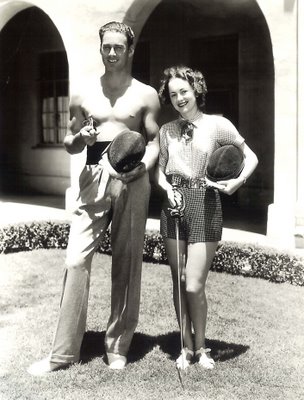
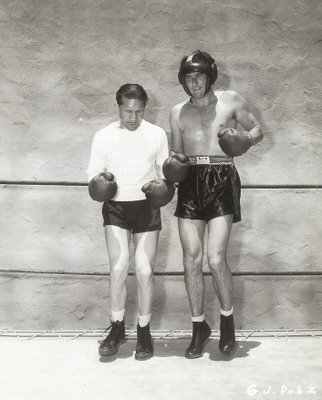
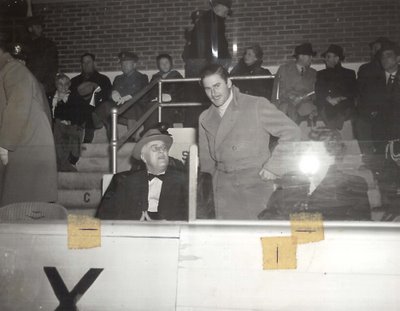
The Bitter Tea Of Errol Flynn
Never a candidate for top echelon standing among Errol Flynn vehicles, Northern Pursuit will no doubt maintain it’s two-and-a-half-star status (if that) in the rating books, while the Robin Hoods and Sea Hawks continue to gather well-earned plaudits --- yet if I were obliged to confine my future Flynn viewing to only one of his movies, Northern Pursuit would be it for me. The why of this lies in what I consider to be the most extraordinary performance of this actor’s career --- one that revealed the scars of a humiliating, and very public, trial for statutory rape in which he narrowly averted an active prison sentence. Errol Flynn was another of those actors who thankfully played themselves. Sparing us phony accents and putty noses, this generation of leading men stood before the mirror of their own sometimes complicated and always dramatic personal lives, revealing more of themselves to their audience than actors of succeeding generations would ever dare. My own advancing age increases my respect for these guys --- soldiering on despite career declines, tumultuous marriages, alcohol abuse --- all of it’s right up there on the screen. Sure, Errol Flynn’s great when he’s riding high in Dodge City or Charge Of The Light Brigade (or here with Olivia DeHavilland in a publicity pose for Captain Blood), but greater for me when he lets go the reins of conventional star deportment and allows the id to run loose. Northern Pursuit works best if you’ve read the Flynn bio. Thomas McNulty has written a good one recently. TCM shows the movie quite a lot. If things had gone differently with that L.A. jury, Northern Pursuit might never have been made at all ….
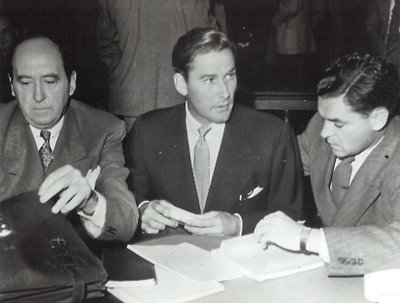
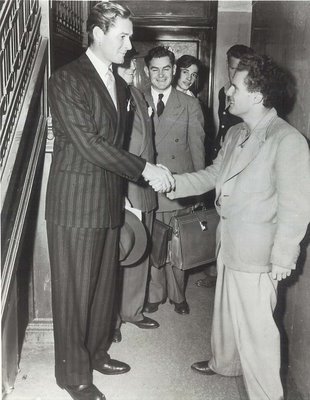
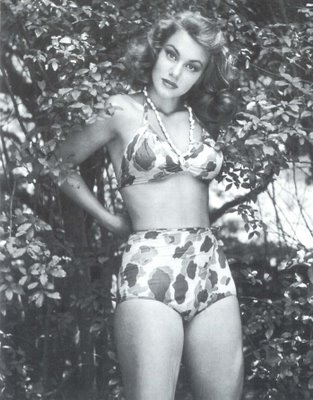 Errol Flynn’s father was the professorial type. In fact, he was a well-respected scholar and instructor in his day. When he wasn’t raising hell and bagging starlets, Errol wanted to be scholarly too. His pre-war image was that of a real-life adventurer --- Olympic boxing (total B.S.), veteran of the classical stage (but where?), private school education (and thrown out of several). All of that suited his soldier of fortune image, but Flynn liked best those earnest young man profiles that found him home with pipe and book, typing away at his latest novel or magazine article. Much of this was actually on the level, and there was a published chronicle of his sea-going adventures, Beam Ends, which appeared in 1937 to generally good reception. Playing truant from Warners that same year, Errol went to Spain as a "war correspondent" to check out the civil war there, and was reported killed at least twice. This was authentic Robin Hood stuff as far as fans were concerned, and it did much to enhance Flynn’s reputation as a thinking man of action. Temptation came by way of sometimes bad company he kept and the compromising situations he fairly hurled himself into. By the war’s opener, Errol Flynn could scarcely boast the constitution of a man twice his age, having weathered, but barely, the recurring assaults of malaria, tuberculosis, and heart disease (here he is training for Gentleman Jim --- he would suffer a mild coronary during the shoot). There was no way this guy was going into uniform, even if he’d wanted to, and my impression of Errol is that he felt some ambivalence about the whole patriotic thing anyway, owing perhaps to citizen-of-the-world status he’d been enjoying for a number of years. With democracy’s future hanging in the balance, he picked a hell of a time to go weekend sailing with underage girls, for this was where his positive off-screen image would have its burial at sea.
Errol Flynn’s father was the professorial type. In fact, he was a well-respected scholar and instructor in his day. When he wasn’t raising hell and bagging starlets, Errol wanted to be scholarly too. His pre-war image was that of a real-life adventurer --- Olympic boxing (total B.S.), veteran of the classical stage (but where?), private school education (and thrown out of several). All of that suited his soldier of fortune image, but Flynn liked best those earnest young man profiles that found him home with pipe and book, typing away at his latest novel or magazine article. Much of this was actually on the level, and there was a published chronicle of his sea-going adventures, Beam Ends, which appeared in 1937 to generally good reception. Playing truant from Warners that same year, Errol went to Spain as a "war correspondent" to check out the civil war there, and was reported killed at least twice. This was authentic Robin Hood stuff as far as fans were concerned, and it did much to enhance Flynn’s reputation as a thinking man of action. Temptation came by way of sometimes bad company he kept and the compromising situations he fairly hurled himself into. By the war’s opener, Errol Flynn could scarcely boast the constitution of a man twice his age, having weathered, but barely, the recurring assaults of malaria, tuberculosis, and heart disease (here he is training for Gentleman Jim --- he would suffer a mild coronary during the shoot). There was no way this guy was going into uniform, even if he’d wanted to, and my impression of Errol is that he felt some ambivalence about the whole patriotic thing anyway, owing perhaps to citizen-of-the-world status he’d been enjoying for a number of years. With democracy’s future hanging in the balance, he picked a hell of a time to go weekend sailing with underage girls, for this was where his positive off-screen image would have its burial at sea.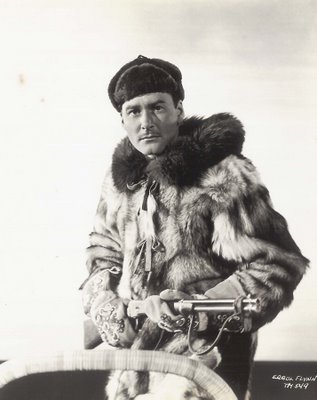
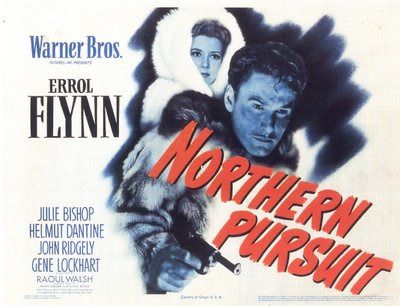
The statutory rape charge was almost certainly a frame. Warners had supported the wrong candidate in a recent election for district attorney, and now the winning team was poised to exact revenge. Errol Flynn was the softest target on the lot (here he is in the courtroom with noted attorney Jerry Geisler on the left). The two girls offered by the prosecution weren’t exactly finishing school types. One look at their clownish demeanor and the predominately female jury members were more than ready to check the acquittal box on their verdict sheet. Flynn was off the hook for three felonies, and the look of exhausted relief is there for all to see as he pauses to shake hands with a well wisher while leaving the courthouse. That was February 6, 1943. The Errol Flynn of yore was gone now, and he’d not be back. Audiences viewed him not as a hero, but a rascal. No longer laughing with him, now they’d laugh at him. The actor who’d once shared the viewing stand at a horse show with President Roosevelt (shown here with Flynn) was now at a crossroads. Would he make a sincere effort to rehabilitate and restore his image, or submit to the public’s mockery of him? Unfortunately, Flynn chose the latter. Linda Christian, his live-in during the trial (that’s her in the bathing suit) would later tell of how he’d party it up with jokers on the night club circuit (the jokes at his expense, of course), then suddenly retreat back home to sit out the brooding night in alcohol-fueled despair. He was a social pariah among the better Hollywood folk, and it wasn’t long before bitterness set in.
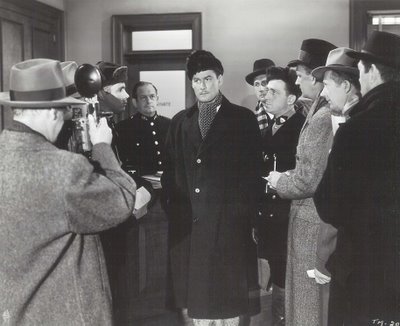
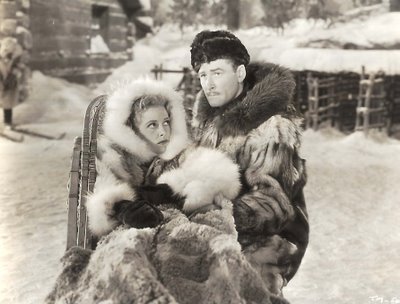
Desperate Journey and Gentleman Jim went into release during that black autumn. Flynn was buoyant and full of life in both. The unintended laughter that rose up among audience members began shortly after his arrest in November of 1942. By Spring the following year, Warners was reassured that Errol’s public still wanted him, but did Errol necessarily want them? One look at Northern Pursuit provided the answer. Gone was the effortless charm, the sense of fun and belief in romance. The hero of Sherwood Forest and Little Big Horn was edgy, intense beyond the demands of an otherwise formulaic part he’d have played in a restful sleep the year before. Now there was hardness and a temper bent toward violent expression that must have shocked fans of the previously relaxed Flynn they thought they knew. He seldom smiles in Northern Pursuit (note these stills and even the poster art). When he stands there and denounces Tom Tully (Flynn’s a Canadian mountie and Tully doubts his loyalty), Flynn's not just playing a scene---he's back on the witness stand in downtown L.A., only this time he doesn't have to be humble and subdued as he was for the jurors---it's a riveting moment. And there's more. Watch how Flynn kicks the camera out of that reporter's hand after he's been disgraced from the service---that's no act---Flynn looks like he wants to kill the guy for real. Northern Pursuit is truly where Errol Flynn’s life merged with his art. Uncertain Glory, The Adventures Of Don Juan, Silver River, The Master Of Ballantrae, Too Much --- Too Soon --- all these would track the personal, but not professional, decline from there. For all the drink, drugs, and failed relationships, Errol Flynn never failed his audience. For those who knew where to look, he offered nothing less than a wide-open window into an often tormented soul.
